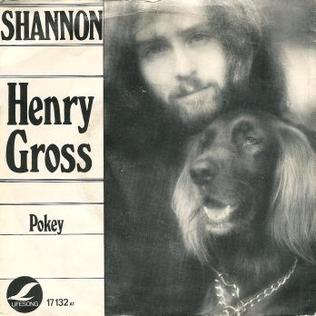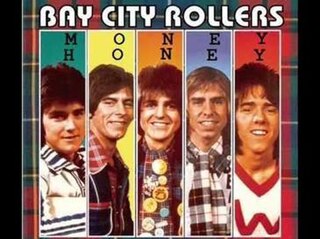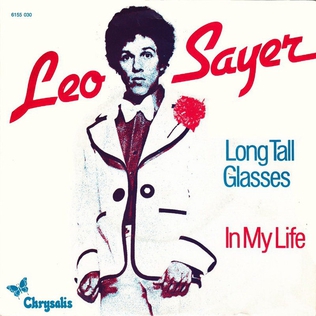
"Ain't Nothing Like the Real Thing" is a 1968 single released by American R&B/soul duo Marvin Gaye and Tammi Terrell, on the Tamla label in 1968. The B-side of the single is "Little Ole Boy, Little Ole Girl" from the duo's United LP. The first release off the duo's second album: You're All I Need, the song—written and produced by regular Gaye/Terrell collaborators Ashford & Simpson—became a hit within weeks of release eventually peaking at number eight on the US Billboard Hot 100 and number one on the Hot Soul Singles chart, the first of the duo's two number-one R&B hits. In the UK "Ain't Nothing Like the Real Thing" reached number 34.

"Chevy Van" is a song by American singer and songwriter Sammy Johns, written and sung by Johns. The song was originally released in 1973 by GRC Records on Johns debut album, which was also released in 1973. The instrumental backing was played by Los Angeles-based session musicians from the Wrecking Crew.

"Reelin' In the Years" is a song by American rock band Steely Dan, released as the second single from their 1972 debut album, Can't Buy a Thrill. It peaked at No. 11 on the US Billboard Hot 100 chart and at No. 15 in Canada.

"Oh Girl" is a song written by Eugene Record and recorded by American soul vocal group the Chi-Lites, with Record on vocals and also producing. It was released as a single on Brunswick Records in 1972. Included on the group's 1972 album A Lonely Man, "Oh Girl" centers on a relationship on the verge of break-up.

"Smokin' in the Boys Room" is a song originally recorded by Brownsville Station in 1973 on their album Yeah!. It reached number 3 in Canada and on the US Billboard Hot 100, and was later certified by the RIAA.

"This Masquerade" is a song written by American singer and musician Leon Russell. It was originally recorded in 1972 by Russell for his album Carney and as a B-side for the album's hit single "Tight Rope". The song was then covered on Helen Reddy's 1972 album, I Am Woman. It was then recorded by American vocal duo, the Carpenters, for their 1973 album Now & Then and as the B-side of the Carpenters's single "Please Mr. Postman". Three years later, "This Masquerade" was recorded by American singer and guitarist George Benson, who released it on his 1976 album, Breezin'. Benson's version, featuring Jorge Dalto on piano, was released as a single and became the first big hit of his career.

"Show and Tell" is a popular song written by Jerry Fuller and first recorded by Johnny Mathis in 1972. This original version made it to #36 on the Easy Listening chart.

"Sweet Hitch-Hiker" is a song by the American roots/swamp rock band Creedence Clearwater Revival from their 1972 album Mardi Gras. It was first released as a single in 1971 and reached #6 on the Billboard Hot 100, becoming their 9th and last top 10 hit. On the Record Retailer UK Singles Chart, it peaked at #36.

"Love Won't Let Me Wait" is a hit 1975 single by Major Harris, a former member of R&B/soul group The Delfonics. Written by Vinnie Barrett and Bobby Eli, the single is considered to be a staple of classic soul playlists, and was Harris' only entry into the top five on both the soul and pop charts. The single hit number five on the pop chart, and also hit number one on the soul chart for one week. Billboard ranked it as the No. 24 song for 1975. It was awarded a gold disc by the R.I.A.A. on 25 June 1975.

"Too Late to Turn Back Now" is the 1972 follow-up single of Cornelius Brothers & Sister Rose to their debut hit "Treat Her Like a Lady". The single had previously been released in 1970 on the Platinum label.

"Shannon" is a 1976 song by Henry Gross. It became an international hit, reaching #6 and achieving gold record status in the U.S. Billboard Hot 100 and #5 on the Cash Box Top 100. The song reached #1 in Canada and New Zealand.

"I Woke Up in Love This Morning" is a song written by L. Russell Brown and Irwin Levine and recorded by The Partridge Family for their 1971 album, Sound Magazine. It went to number 13 on the Billboard Hot 100 in 1971; it hit number 4 in Canada.

"Swearin' to God" is a song written by Bob Crewe and Denny Randell. It was recorded by Frankie Valli and released in May 1975 as a single from his album Closeup. It is a love song whose lyrical hook is a more literal use of the expression "I swear to God" :

"Let Her In" is a song written and recorded by English singer-songwriter Gary Benson, and released as a single in 1973. It was covered by John Travolta in 1976, and was released as the first single from Travolta's self-titled second album. Travolta's version was a hit, spending five months on the U.S. Billboard Hot 100, and peaking at number 10. It also reached number 16 on the Adult Contemporary chart. On the Cash Box chart, the song peaked at number five. In Canada, "Let Her In" reached number seven on the RPM Top Singles chart.

"Clap for the Wolfman" is a song written by Burton Cummings, Bill Wallace, and Kurt Winter performed by their band, the Guess Who. The song appeared on their 1974 album, Road Food. The song was ranked #84 on Billboard magazine's Top Hot 100 songs of 1974.

"Money Honey" is the title of a 1975 international hit single by the Bay City Rollers, taken from their album Rock n' Roll Love Letter and in the UK on their album Dedication. The power-pop recording was issued in the US as the album's lead single in January 1976, reaching number nine on the Hot 100 in Billboard magazine that March. "Money Honey" was the Bay City Rollers' second US Top 10 hit. It reached number seven on the Cash Box chart. The follow-up single was the album's title track, "Rock and Roll Love Letter". In the UK, "Money Honey" was released in November 1975 and reached number three, becoming the group's ninth Top 10 single.

"Did It in a Minute" is a song performed by American duo Hall & Oates. Written by Daryl Hall with Sara and Janna Allen, the song was released as the third of four singles from the duo's tenth studio album Private Eyes in March 1982. Daryl Hall performs lead vocals, while John Oates provides backing harmony vocals.

"Tight Rope" is the debut 1972 hit single by singer-songwriter Leon Russell. It was the lead track on his LP, Carney.

"Long Tall Glasses (I Can Dance)" is a 1974 song by Leo Sayer, co-written with David Courtney. It was released in the United Kingdom in late 1974, becoming Sayer's third hit record on both the British and Irish singles charts and reaching number four in both nations. It was included on Sayer's album Just a Boy.

"One Fine Morning" is the second single released off of Lighthouse's 1971 album, One Fine Morning. The song is one of the band's most successful singles, making the top of the charts in Canada, and becoming their most popular single released in the United States.




















